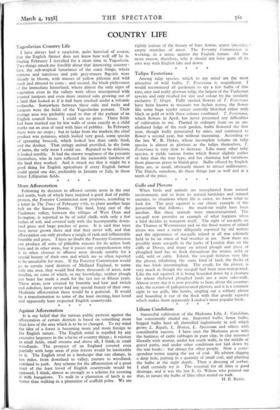COUNTRY LIFE
Yugoslavian Country Life I have always had a suspicion, quite heretical of course, that the English farmer does not know how well off he is. During February I travelled for a short time in Yugoslavia. Two things struck me forcibly about that interesting country : first, the sub-tropical luxuriance of the coast fringe, where mimosa and narcissus and pale grey-mauve flag-iris were already in bloom, with masses of yellow phlomis and wild stock and almond to come ; and second, the black pitilessness of the immediate hinterland, where almost the only signs of vegetation even in the valleys were olives interspersed with stunted junipers and even more stunted oaks growing out of a land that looked as if it had been crushed under a volcanic avalanche. Somewhere between these oaks and rocks and junipers were the fields of the Yugoslavian peasant. Their average area was probably equal to that of the parlour of an English council house. I could see no grass. These fields had been marked out by low walls of stone exactly as a child marks out an area of sand with lines of pebbles. In February there were no crops ; but to judge from the markets the chief product was potatoes, which looked very good, some species of sprouting broccoli, which looked less than cattle food, and the donkey. That stringy animal provided, in the form of hams, the only meat I could see. Reputed to be delicious, it looked terrible. It had the sinewy toughness of the peasants themselves, who in turn reflected the inexorable hardness of the land they worked. And it struck me that it might be a good thing for English agriculture if every English farmer could spend one day, preferably in January or July, in those bitter Lilliputian fields.






































































 Previous page
Previous page